2020 Special Report: Cyberbullying in the Age of COVID-19
The Coronavirus (COVID-19) pandemic has thrown the world into a new and unprecedented era of uncertainty, financial instability and chaos. Professionally, many of us have had to transition to a completely new virtual workplace. Students are struggling to complete their studies from home, a true challenge in any era.
What is getting lost in this conversation is the potential for increases in online victimization, abuse, and cyberbullying. The lockdown may provide some form of relief from in-person victimization and bullying. For many, and what could be more troubling, is that same harassment has shifted and even increased online.
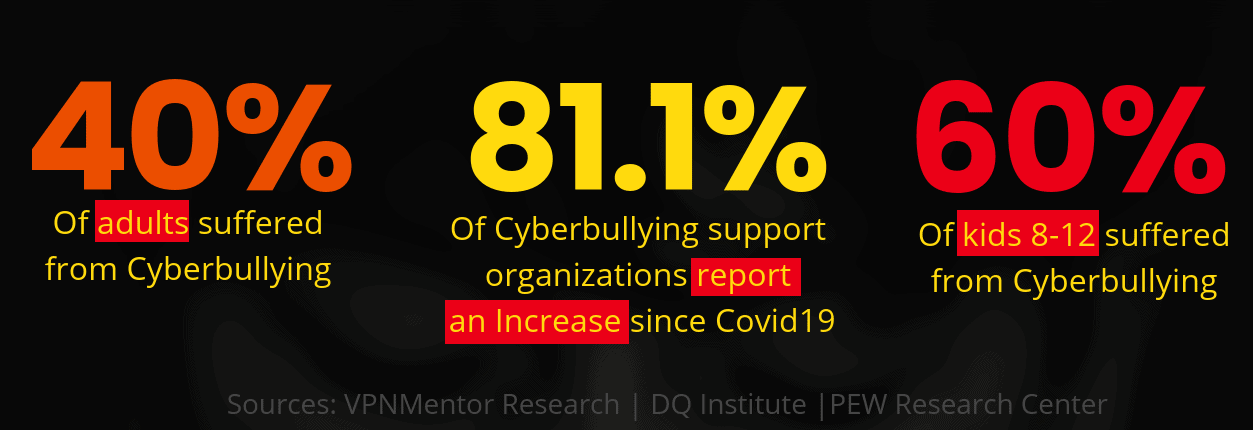
Many non-profit agencies and victim support lines are struggling to stay afloat right now, and that has obviously extended to the cyberbullying resource community. The pandemic has affected professional organizations that are normally fully-staffed, answering phone calls, and responding to complaints and reports from victims. Our researchers wanted to discover just how those resources have been impacted, and do a further deep dive into how a world thrown into chaos by Coronavirus is handling online harassment.
Using data that we’ve gathered from our own research, we’ve found that vulnerable communities, ranging from people with varying racial backgrounds, LGBTQ, as well as children and young adults, have gone up dramatically from benchmark 2018 and 2019 numbers.
This article will dig into our findings and how the current pandemic is negatively impacting those communities online.
VPNMentor New Cyberbullying Data (July 2020)

49.7% of contacted organizations did not answer phone numbers, chats and emails listed on their websites and resource pages.
16.7% of those organizations were either temporarily or permanently closed.
People of all ages in every community are left without the normal level of resources for reporting, counseling, and general support. Whether or not these organizations will rebuild or reopen during the pandemic remains as uncertain and cloudy as any other aspect of this global crisis.
Research Methodology: Our researchers called 199 cyberbullying organizations and local hotlines internationally (USA, Australia, New Zealand, Canada, England, Ireland, Scotland, Wales, Netherlands, Switzerland, South Africa, Puerto Rico and the USA Virgin Islands).
The survey included a short interview with a qualified support operative with over 12 months seniority in the center. Every operative was inquired about the center's operations before and during the outbreak, with open questions to establish notion and survey questions regarding the center's workload and effective response capabilities. The survey's focus period was February-July 2020.
Cyberbullying: Children and Teens
In the years previous to the pandemic, cyberbullying was already at troublesome levels, with as many as 1 of 5 of children and teens experiencing some form of bullying or harassment. With more than one billion students attending school from home, international experts are expressing deep concern that social isolation will provide increased opportunities to online harassment along with its dangerous effects.
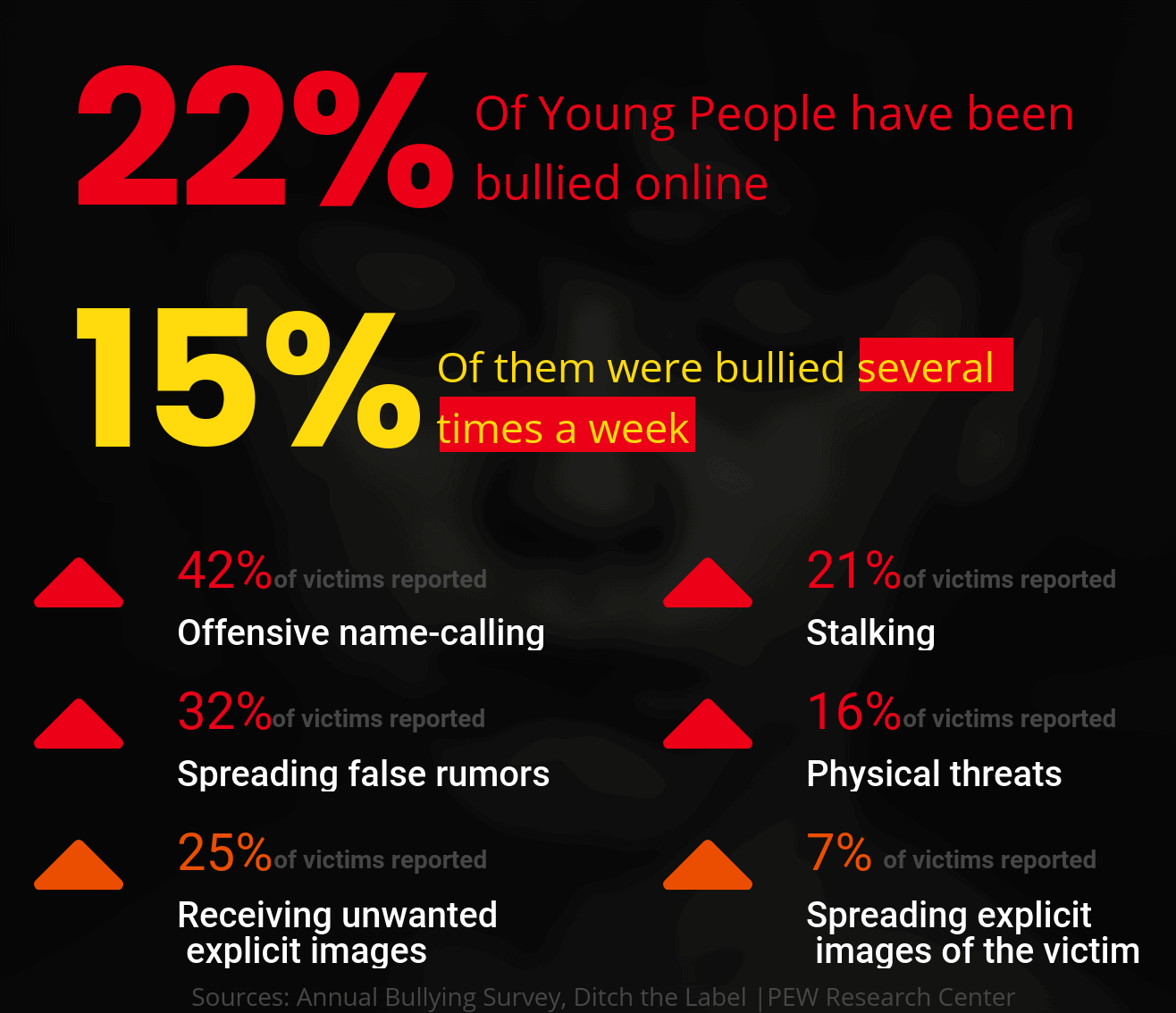
Among the obvious dangers of cyberbullying are its invisible impacts, namely that its perpetrators have the added benefit of actual invisibility. It’s far easier to harass a child or a young person online because it’s never happening in person.
Online harassment has the added potential of reaching a very large audience very quickly, something that’s even harder to replicate in a physical environment.
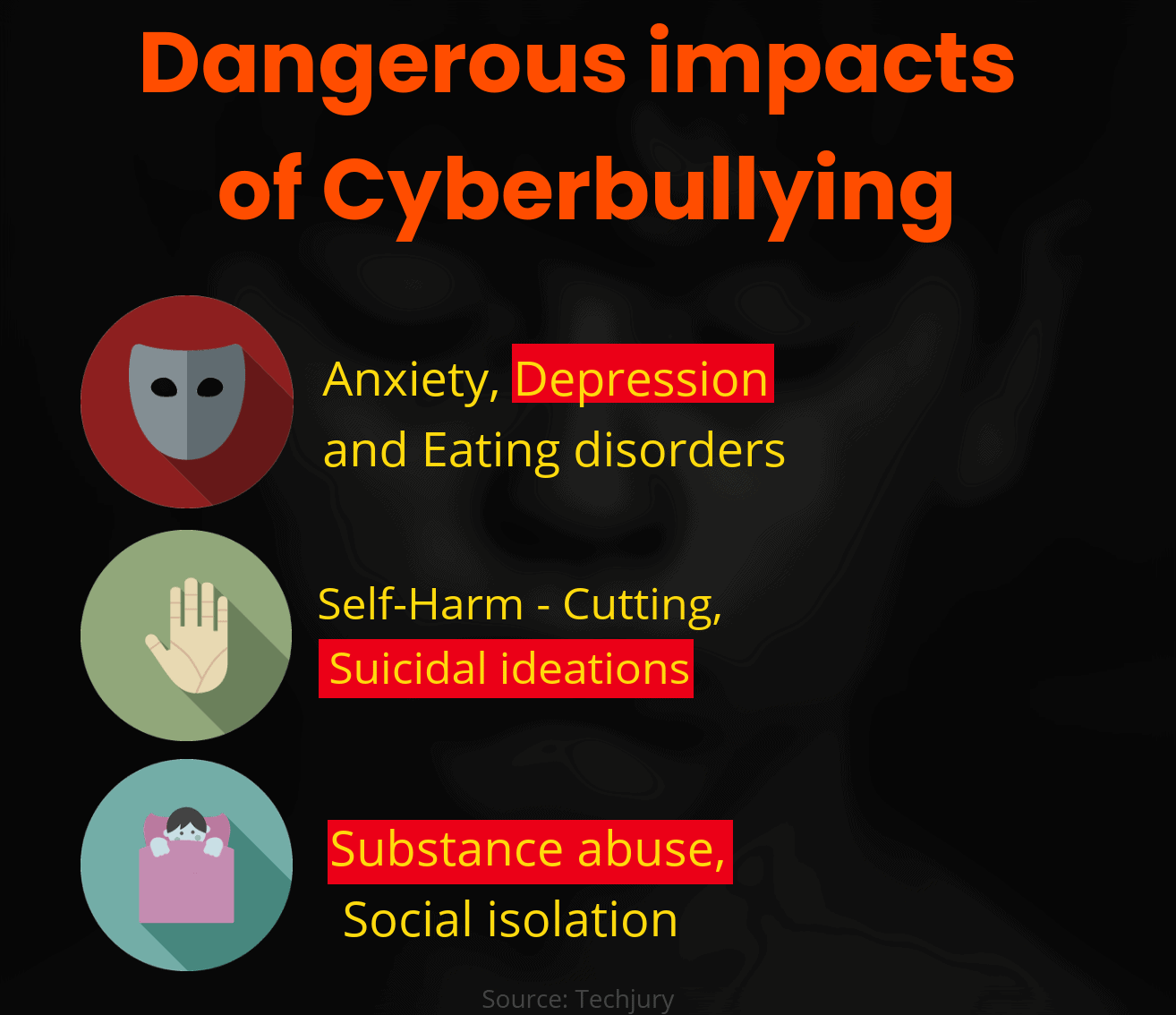
The epidemic has forced children to go online even more than usual, in order to keep up with their schoolwork. Such prolonged exposure is risky even without hordes of trolls, hatemongers, pedophiles and others who were also locked in, and prowling for victims.
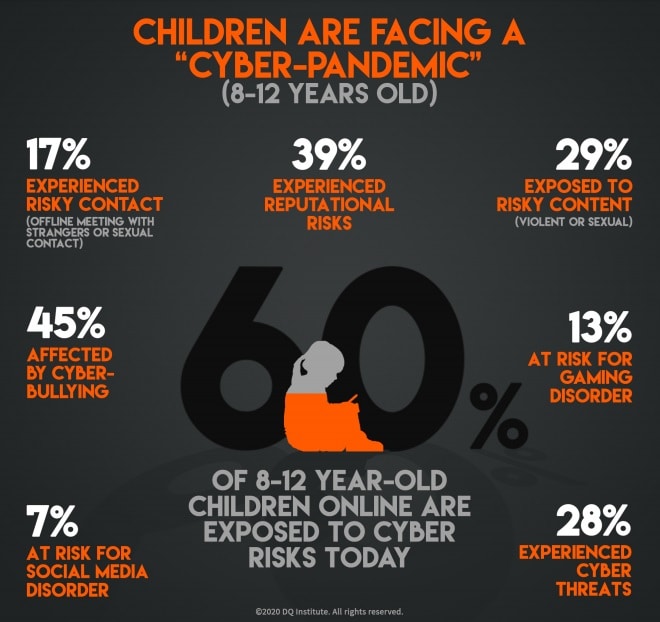
How Adults Experience Cyberbullying in 2020
Yes, teens and children are more vulnerable to any type of bullying and abuse than adults, but adults are not granted exceptions from online harassment.
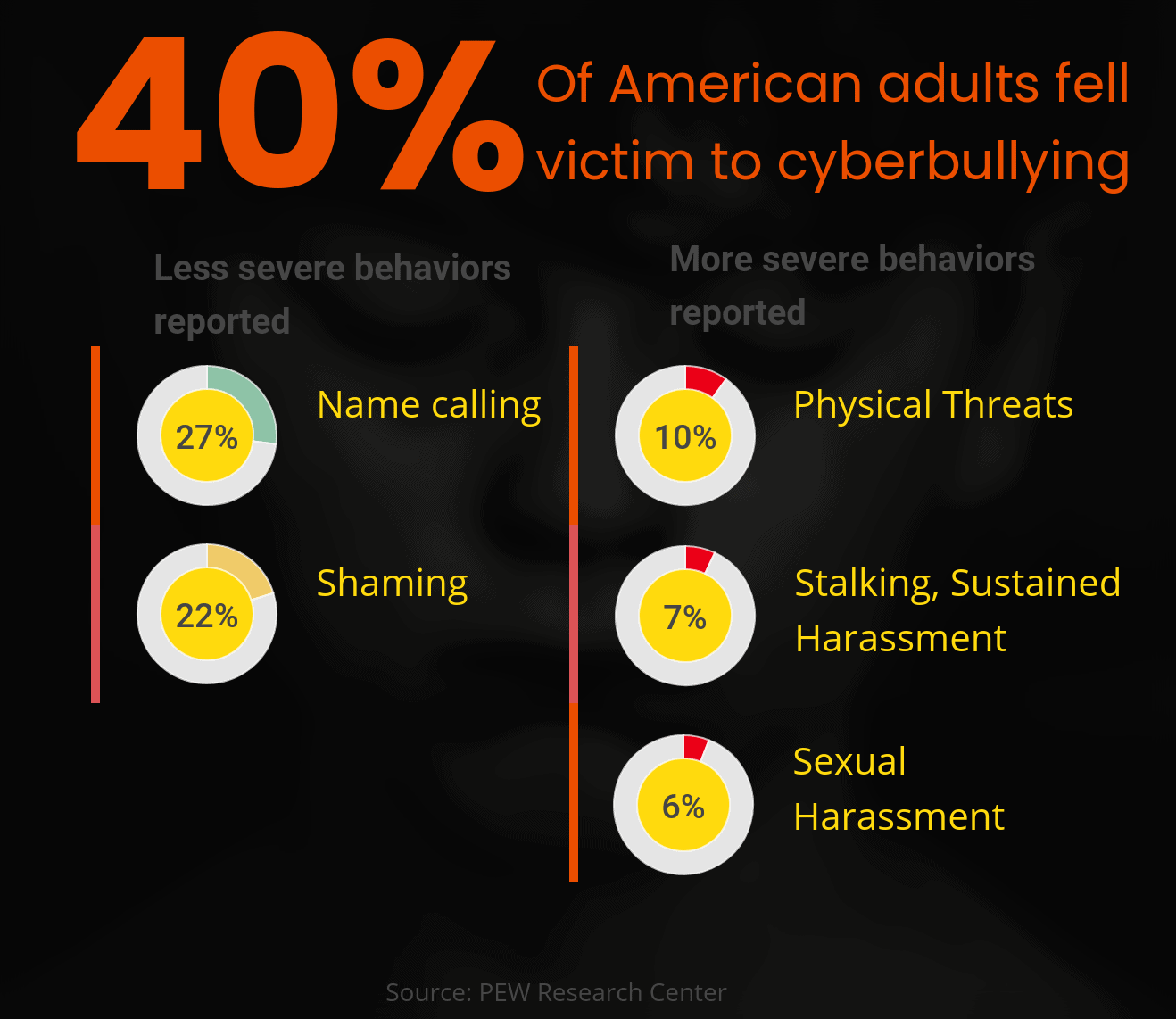
In 2014, a video game industry professional, who happened to be a woman, was severely harassed and attacked online. What eventually became known as GamerGate started out as a form of online revenge, an ex boyfriend stalking a woman who simply ended a relationship. It ended up turning into a symbolic movement online against women of all stripes who spoke out against sexist imagery of women in video games. It is easily one of the ugliest moments in internet history when it comes to online abuse.
Cyberbullying within online games is still a massive problem, with over 57% of respondents to a Ditch the Label survey stating they’d been subjected to hate speech.
Another example of online hate that targets women is revenge porn. More and more law enforcement agencies are developing tactics of punishing people - mostly men - who flood the internet with often faked images of ex girlfriends, colleagues, and sometimes bosses. In one case, a woman had to file a copyright for her own breasts to force websites to remove images of her.
Online Harassment and Cyberbullying of LGBTQ Community
LGBTQ youth are more likely to use the internet as a resource to seek out help and guidance. Respected academic studies have shown that young people who identify as LGBTQ use the web and social media platforms to build the social capital and freedom they are often denied in school or at home.
Prior to Coronavirus, that segment of society was already quite active online and while also being one of the most vulnerable online communities. If you’re the parent of an LGBTQ student or are a member of the LGBTQ community as an adult: there is a far greater chance of your being exposed to cyberbullying. Why? Cyberbullies focus their attention and actions on marginalized groups because those individuals are far less likely to speak out if they are afraid of being outed.
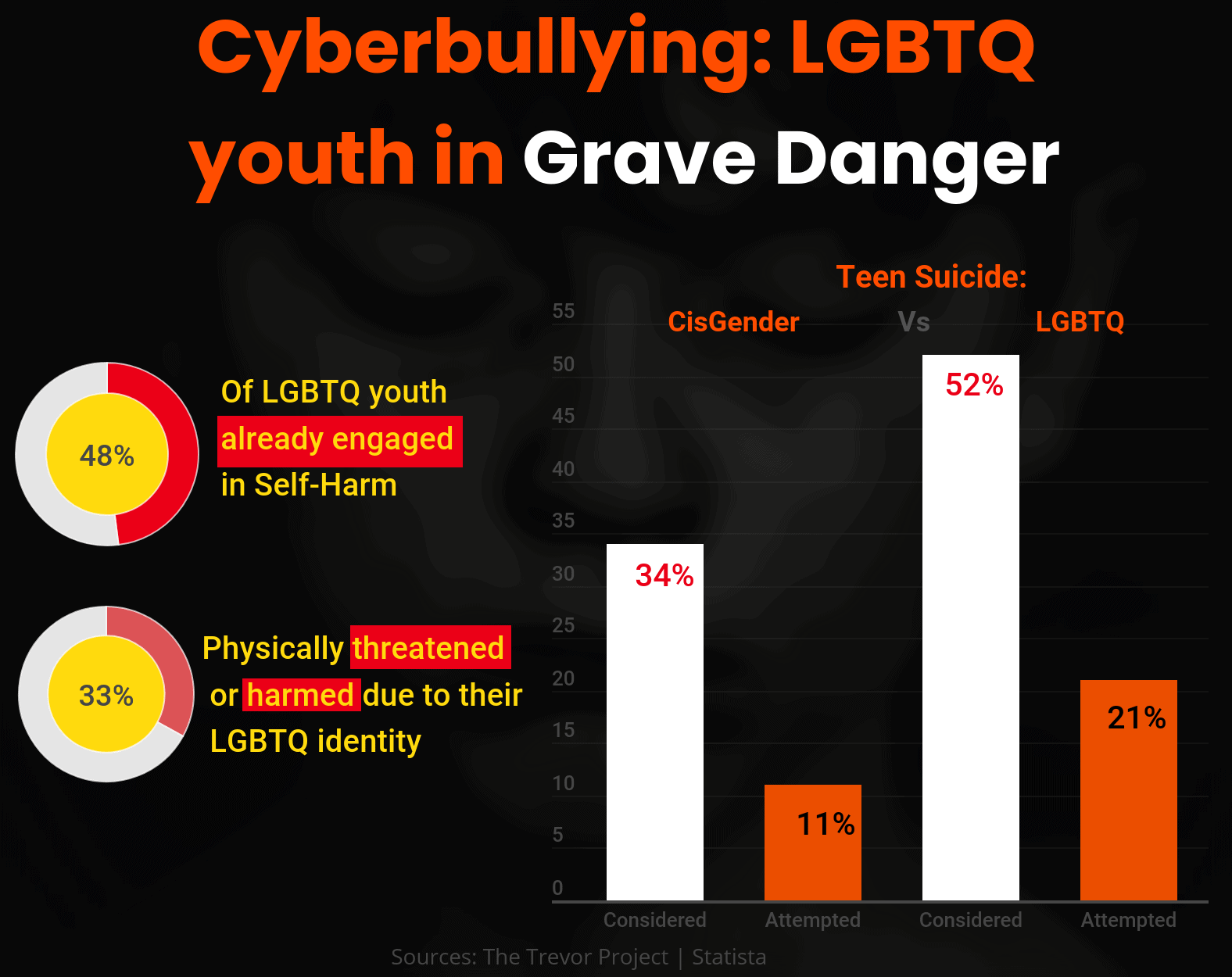
Even during the best of times, LGBTQ young people and adults grapple with online abuse and harassment regularly. In 2013, the advocacy group GLSEN (Gay, Lesbian & Straight Education Network) reported that LGBTQ youth are three times more likely to experience online harassment and bullying as non-LGBTQ youth.
Other data in the same report revealed that LGBTQ youth were “more likely than non-LGBT youth to be bullied or harassed online (42% vs. 15%) and twice as likely to say they had been bullied via text message (27% vs. 13%).” The survey cited that “respondents also reported they were as likely to report not feeling safe online (27%) as they were at school (30%).”
So far what we know in 2020 is harrowing. The Trevor Project reported that in 2020, prior to the Coronavirus pandemic, nearly half of LGBTQ youth considered suicide. 48% of those teens surveyed reported they had already engaged in self harm. The majority of young people in that segment, or a telling 86% “also said that the current political climate has impacted their well-being negatively.” Another 33% reported they have been “physically threatened or harmed due to their LGBTQ identity” already in their lives.
We can draw some conclusions from these numbers as compared to the foreboding statistics we pulled from our research. If LGBTQ teens spend more time online and are more likely to be harassed online, those issues could compound even more when we’re all sheltering in place. LGBTQ youth are also more likely to suffer from the ensuing emotional trauma of that abuse than their heterosexual peers prior to Coronavirus: During the pandemic, those numbers are going to rise and they’re going to rise a lot.
Without the usual list of resources, LGBTQ teens need a supportive environment where they can feel safe and protected. Remember: those anonymous reporting tools are not as robust as they were pre-COVID. We don’t know if, and when, they will rebound, if at all.
For more tips, check out the VPNMentor online safety guide for the LGBTQ community.
How Cyberbullying is Fueling Online Racism
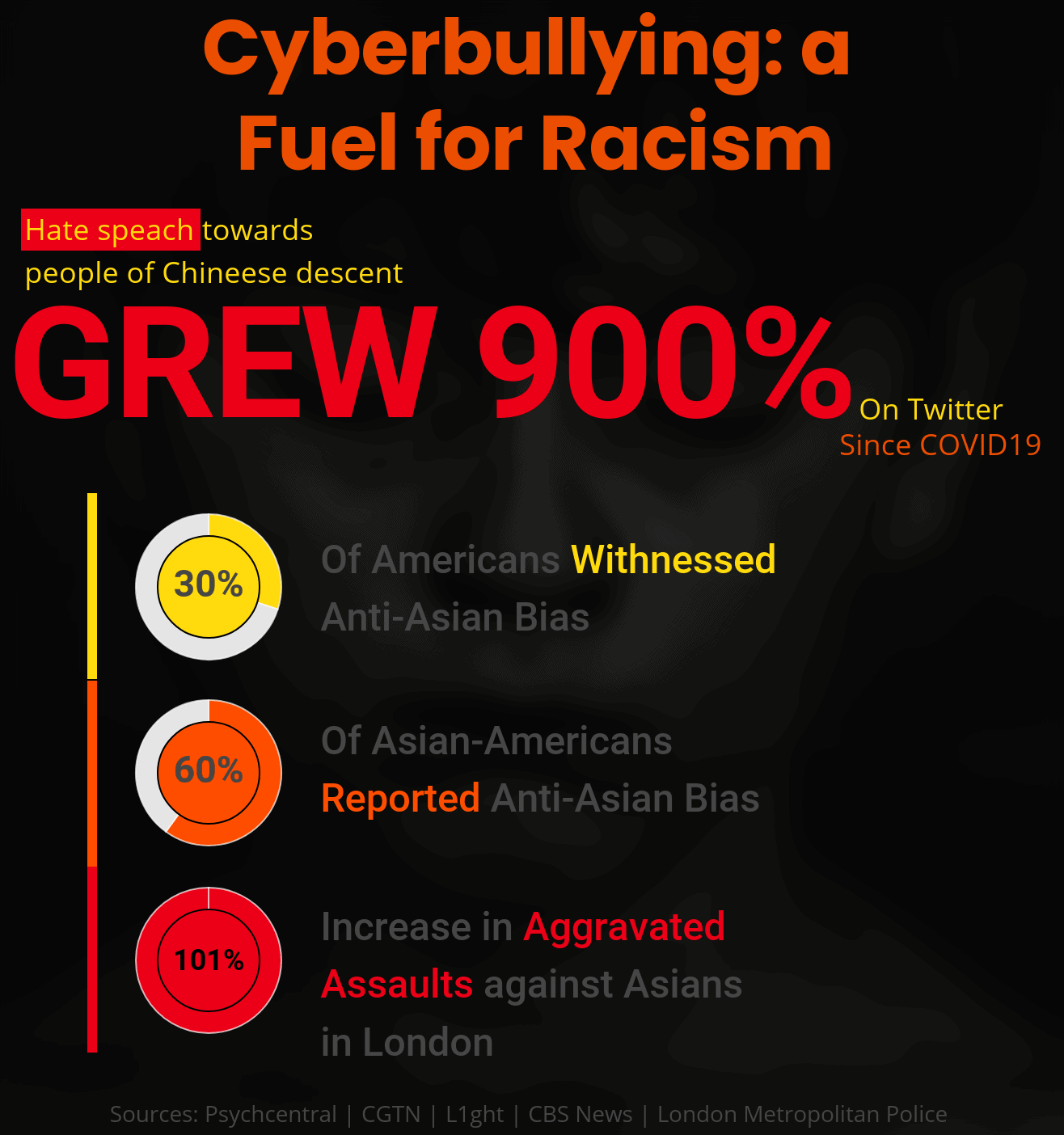
The political climate mixed with Coronavirus is creating dangerous and violent obstacles for some racial minorities. With United States President Donald Trump regularly referring to the virus as the “kung flu”, an obvious reference to the pandemic’s outbreak in China, Asians are now facing unprecedented online harassment that often leads to real-life violence and attacks.

Human Rights Watch has sounded the alarm, reporting a spike of anti-Asian xenophobia globally. In a story about online harassment, Al Jazeera reported its independent research that uncovered “more than 10,000 posts on Twitter that included the term "kung-flu" during March alone - although the true total was likely much higher given a number of variations of the phrase were being used across the site.”
There is documented online xenophobia from reliably racist and white nationalistic online forums includig 4Chan. A group of academics banded together to form the Network Contagion Institute and did a deep dive onto 4Chan’s more notably hate-filled sub groups, including the infamously racist “Politically Incorrect” sub thread.
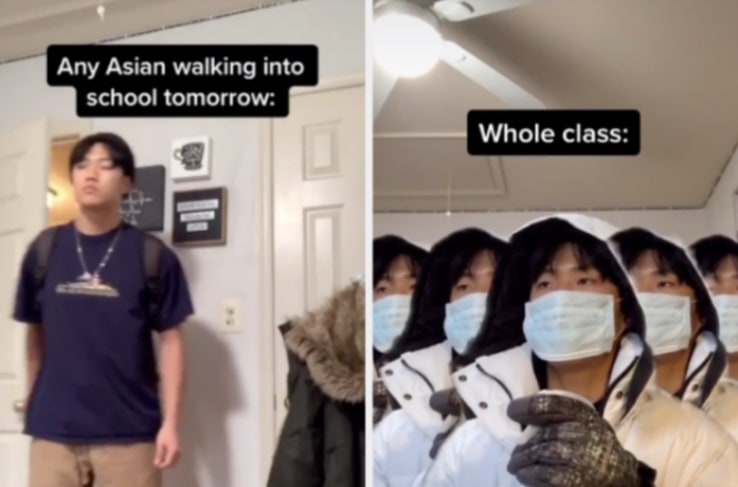 A Racist post from TikTok | Source: Buzzfeed News (TikTok)
A Racist post from TikTok | Source: Buzzfeed News (TikTok)
What the group uncovered is unpleasant, but hardly shocking considering the context. The report, entitled “Go eat a bat, Chang!” (named for the racist rhetoric in the group), charts the rise of anti-Chinese rhetoric on the Internet post-pandemic. A summary of the findings from the report: “We find a rise in discussions related to China and Chinese people on Twitter and 4chan’s /pol/ after the outbreak of the COVID-19 pandemic. At the same time, we observe a rise in the use of specific Sinophobic slurs, primarily on /pol/ and to a lesser extent on Twitter. Also, by comparing our findings to real-world events, we find that the increase in these discussions and Sinophobic slurs coincides with real-world events related to the outbreak of the COVID-19 pandemic.”
In simpler words: the type of anti-Asian discourse that's causing a rise in violence is notably escalating on the internet.
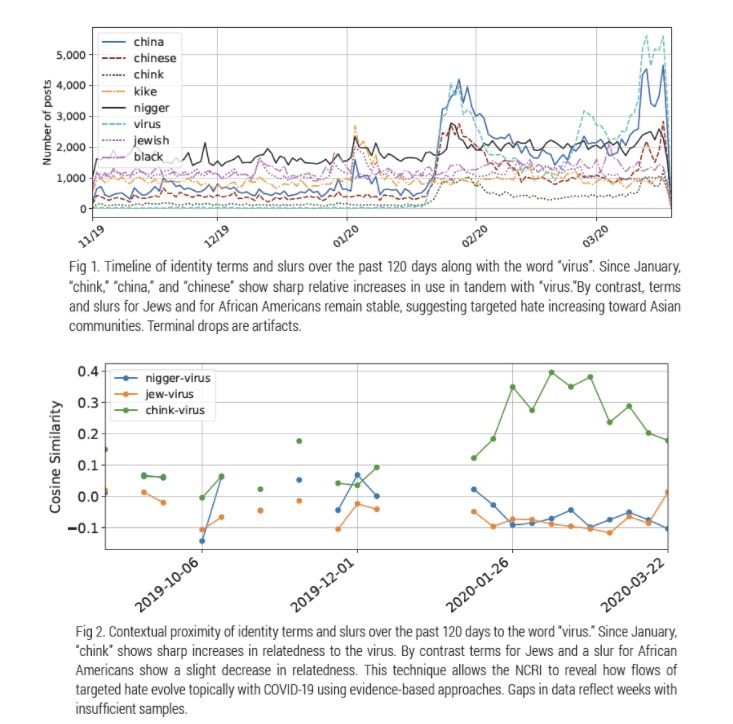 Source: Rutgers University and The Miller Center for Community Protection and Resilience in Partnership with Network Contagion Research Institute
Source: Rutgers University and The Miller Center for Community Protection and Resilience in Partnership with Network Contagion Research Institute
How the Pandemic is Driving Us Online
Of course, during lockdown, internet traffic and usage has spiked. Overall internet usage is up 70%, with US streaming sites like Netflix and Disney+ seeing around 12% growth.
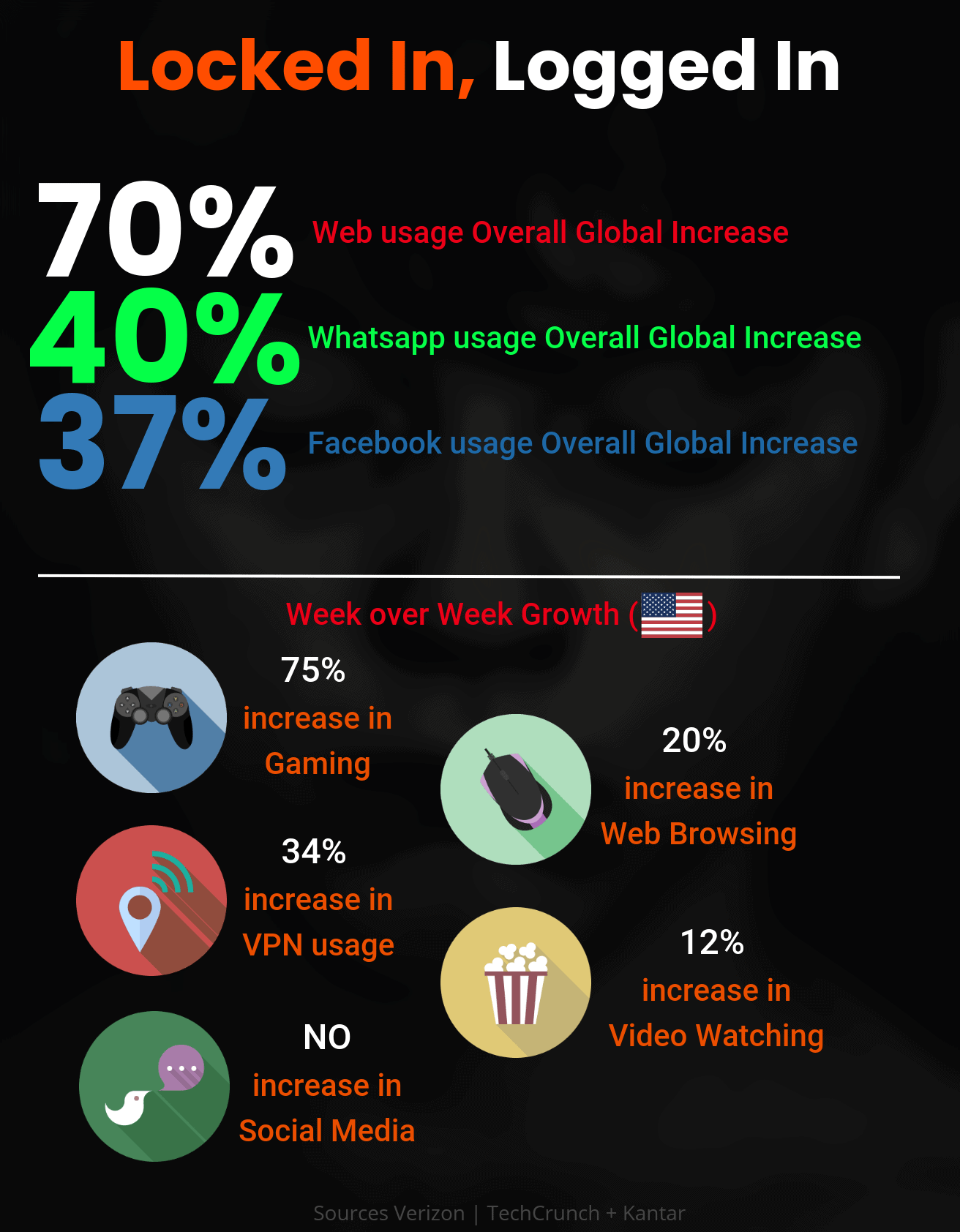
People aren’t just flocking to streaming content and Zoom meetings. We did more digging into other apps that users are jumping on now more than ever. We wanted to examine how that usage has grown on those platforms that tend to be hotspots for cyberbullying, namely: Gaming, social media, and messaging apps.
Social Messaging Apps reached impressive usage stats: WhatsApp Increased 40% in usage overall, and in Spaid it had a 76% jump. All of Facebook's apps saw a sharp increase, mostly by users age 18 to 24.
In Australia, overall internet usage jumped by 56% during lockdown. Social media was the 4th most popular category according to the Australian eSafety Commissioner’s survey. The same survey reported that nearly a third, or 26% received unwanted contact or messages. 12% stated they were sent inappropriate content
Activision Blizzard Games (COD, WOW, Candy Crush) had one of its best second quarter earning reports ever, signalling that online users are clamoring for gaming content.
We already know that messaging apps and online games are hotbeds for hate speech and online abuse. It makes perfect sense that without anywhere to go, young people will flock to the fun and potentially harmless pastimes of chatting and gaming with friends online. The challenge remains that those platforms have done little to nothing to modify or manage hate speech, leaving often naive and defenseless tweens and teens open to long term harm and emotional damage from cyberbullying.
How Well is Your Nation Battling Cyberbullying?
Where you live could impact the resources and tools available to help you and your children respond to and manage cyberbullying.
We dug up some statistics on which countries are managing online safety better than others.
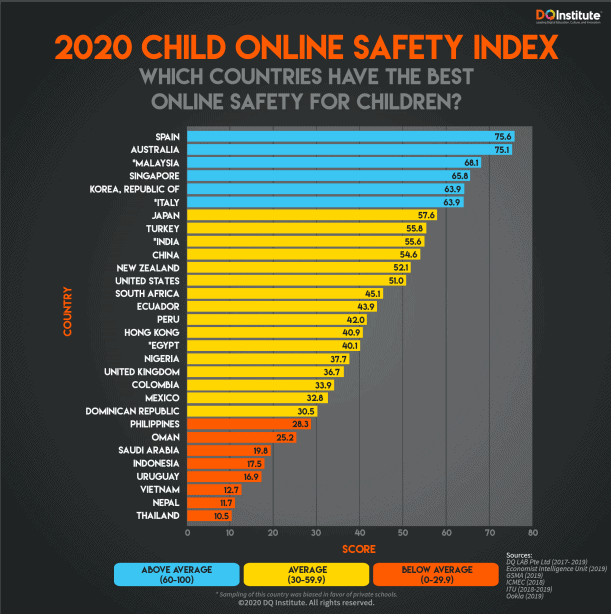
Using data from countries around the world, UNESCO discovered that of the 10 countries with the highest rates of cyberbullying, boys were more likely to be victims than girls. That research concluded in 2018 that one-third of youth globally experience bullying in school.
Boys experience slightly higher rates of bullying in school than girls overall, but in countries where bullying is most pervasive, girls are more vulnerable.
Low socioeconomic status is the main predictor of whether young teens in wealthy countries will experience bullying in school.
Immigrant youth in wealthy countries are more likely to be bullied in school than locally-born youth.
What Can You Do in Case of Cyberbullying?
Check out VPNMentor’s guides here:
- The Ultimate Parent Guide for Protecting Your Child on the Internet [Updated for August 2020]
- The Empowering Internet Safety Guide for Women
Bottom Line
It’s so easy to lose focus on something like online abuse and harassment when all of us are scrambling to stay healthy and safe, trying to avoid financial damages or just keep things normal in these harsh times. This research shows that we did lose focus, even though Cyberbullying can be just as lethal as the Pandemic itself; without an effective support infrastructure, people might take their own lives just to end the suffering. While we all must be vigilant and aware, talk with our peers and kids about this dangerous subject – We can't dedicate ourselves for that - and that's where support organizations come in. Without their help, every group mentioned here will suffer greatly, and so will society itself. And while the COVID vaccine will be developed eventually, the damages of skyrocketing online cruelty will linger on, and be far more complicated to cure.
Sources:
https://www.dqinstitute.org/wp-content/uploads/2020/02/2020COSIReport.pdf
http://uis.unesco.org/en/news/new-sdg-4-data-bullying
https://arxiv.org/pdf/2004.04046.pdf
https://l1ght.com/Toxicity_during_coronavirus_Report-L1ght.pdf
https://news.cgtn.com/news/2020-05-17/Racism-spreads-online-offline-amid-COVID-19-outbreak-fueled-by-Trump-QyZvhMFYD6/index.html
https://www.forbes.com/sites/markbeech/2020/03/25/covid-19-pushes-up-internet-use-70-streaming-more-than-12-first-figures-reveal/#18f40eaf3104
https://www.ipsos.com/en/global-views-cyberbullying
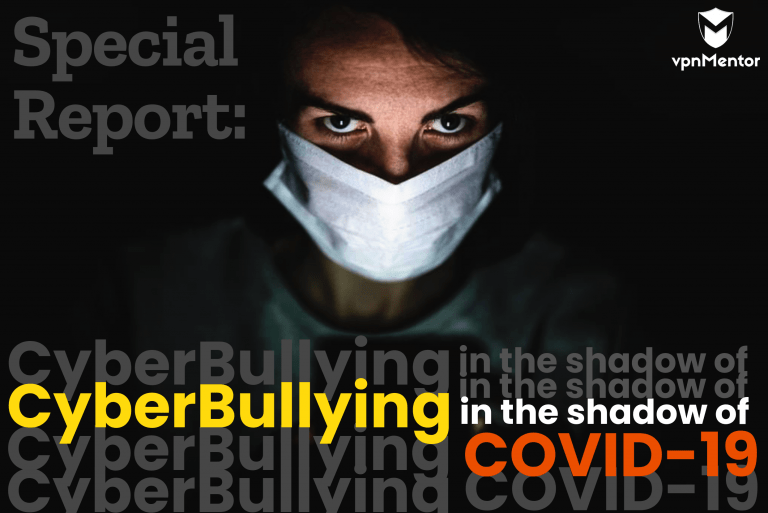


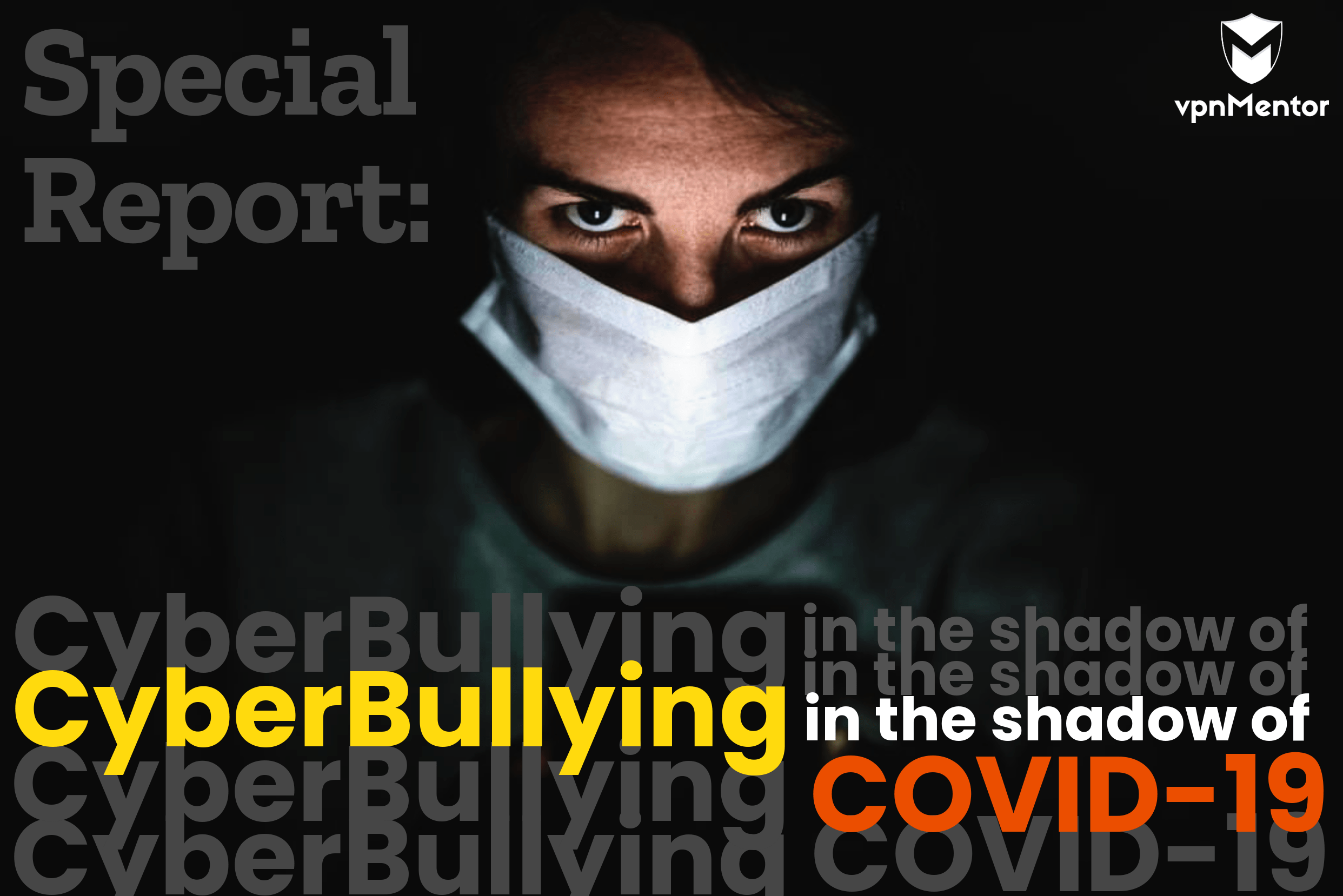

Please, comment on how to improve this article. Your feedback matters!